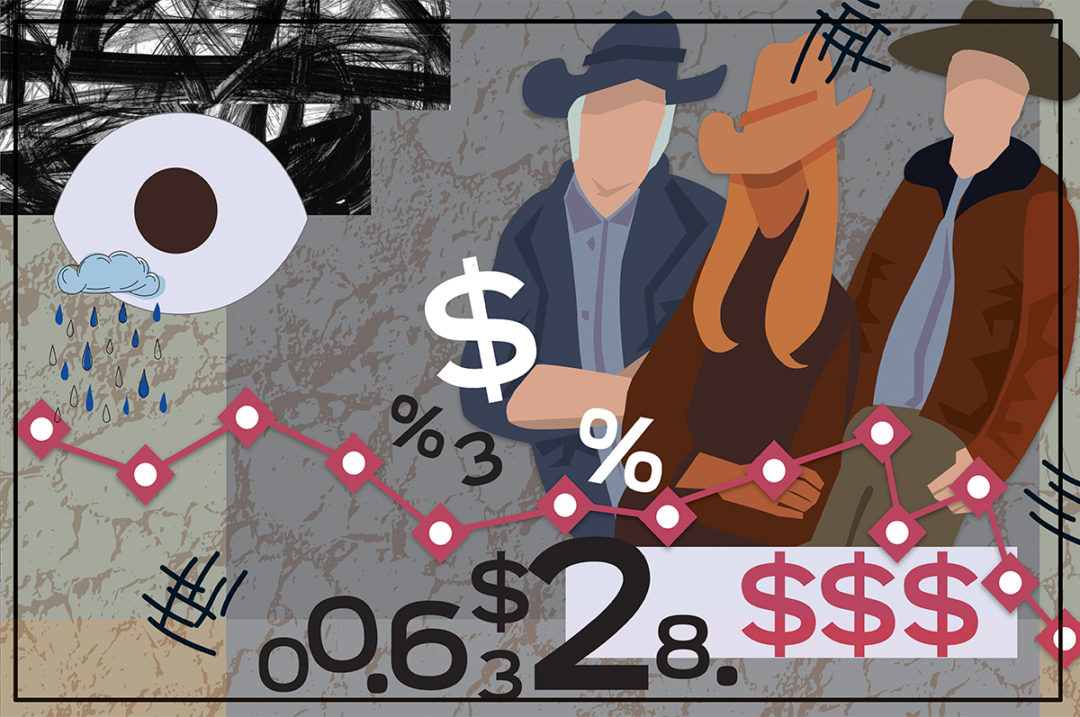Mental health is a critical, wide-ranging topic. Like-minded individuals rooted in the agricultural world, while often skilled at building walls around themselves and their thoughts and actions, are never immune from its wide-ranging influences. Likewise, these influences are not deterred by country or state borders, but flow unchecked through these communities.
The U.S. Centers for Disease Control and Prevention states farmers and ranchers are twice as likely to die by suicide as those in other occupations. A conservative estimate shows 225 million farmers worldwide struggle with mental health. Canadian statistics indicate a 20% to 30% higher degree of suicide in agriculture than in any other industry.
“Much of a farmer’s world is out of their control while directly influencing their ability to be successful,” says Megz Reynolds, executive director of the Do More Agriculture Foundation. “Weather, land, inputs and equipment costs, trade and globalization, and being multigenerational representatives all play a major role in a farmer’s mental health status.”
She explains that farming is unique as it ties participants to a multigenerational sense of self-worth and identity. When generations past built the farm and current descendants attempt to operate it with these largely uncontrollable factors hanging overhead, massive amounts of pressure consistently weigh them down. Many feel they can’t continue from an economic standpoint but the guilt of failing everyone who came before them muddies the waters.
“They worry they won’t be able to set up their kids as the next generation or wonder if it should even be encouraged,” Reynolds says. “Will their confusion let down their immediate family and ancestors? Living and working with family is incredible at times, but it also makes it impossible to disconnect.”
Warning signs to be aware of manifest in trouble falling asleep or sleeping in general, chronic levels of anxiety, feelings of procrastination, becoming overwhelmed, having trouble concentrating, self-isolation, workaholic tendencies and physical aches, pains and chronic headaches.
“Farmers often try to shut these feelings in a box, but eventually their body makes it clear they can’t be ignored,” says Reynolds. “Feelings of never getting enough done lead to exhaustion, complete energy depletion and a sense of worthlessness, hopelessness and failure.”
4 A’s: Perceived barriers to seeking help
Karen Endres, coordinator of the Wisconsin Department of Agriculture, Trade and Consumer Protection’s Farmer Wellness Program, believes four key barriers (the 4 A’s) combine to discourage farmers from seeking help.
- Affordability tops the list, as medical care is expensive and many plans don’t cover mental health services.
- Accessibility is key, as farms and ranches are often isolated in rural communities. After the pandemic, health professionals were tapped out, making help even more difficult to access in these remote environments.
- Awareness becomes an obstacle when long-standing rural culture preaches to “pull yourself up by the bootstraps.” Feeling stressed becomes the norm when nothing different is known.
- Acceptability is the fourth barrier, as mental health issues still carry negative stigmas that offer an obstacle to seeking help.
“I often say every farmer knows what every other farmer drives, and if your truck is parked in front of the therapist’s office, that could be a problem,” Endres says. “Negativity quickly jumps to mind for passersby.”

Breaking down the barriers
To address these four barriers, Endres focuses on specifics targeting each. To counteract affordability, her program offers a free 24/7 phone line. Ranchers and farmers can call day or night and speak to an experienced stress counselor who understands agriculture.
“They don't want to hear from someone telling them to take a day off,” she says. “They’ll get frustrated with anyone who doesn’t understand the culture and lifestyle.”
To counteract accessibility issues, they’ve instituted telecounseling where callers are quickly linked to a counseling appointment rather than waiting six months through normal health insurance plan channels.
Free and confidential counselor voucher systems for quick connections to health service providers are a new effort. Online support groups and podcasts bring together all types of farmers, whether they be livestock, beef, dairy, organic or traditional, with similar issues helping drive awareness.
“If you had told me when I started this job that farmer Zoom calls for this issue would have been successful, I’d have said it’s never going to work, but our sessions are full every month,” says Endres. “People are finding community after the pandemic shattered it.”
This added awareness also helps build up the acceptance factor and breaks down negative stigmas as those seeking help find others with surprisingly similar challenges.
Addressing negative stigmas
Reynolds believes two types of negative stigmas are still attached to mental health issues.
- An external stigma manifests itself in communities large enough to have mental health professionals. Farmers could visit them but are often hesitant, as someone they know might recognize their vehicle. It’s assumed they’ll be judged as weak. “We’re moving the needle against this type of stigma, putting mental health components in agricultural shows and conferences,” Reynolds says. “This level of exposure wasn’t happening five years ago.”
- The internal stigma aspect appears when farmers outwardly express positivity and support toward health issues while simultaneously admitting they would never need help themselves. “Acknowledgment and acceptance are separate entities,” Reynolds says. “We need to keep breaking down this internal stigma through the normalization of these conversations. It’s so important for rural people to see others like themselves talk about these issues.”
Endres measures the Farmer Wellness Program’s success by pointing to the record-breaking number of one-hour counseling vouchers redeemed during their last fiscal year. While she’s encouraged by these statistics, she admits it’s not good enough. New active live data has shown an even higher rate of vouchers being redeemed through the end of March 2024.
“We’re crushing last year’s data records,” she says. “Farmers are finding the value, and our programs are growing as more people talk about mental health.”
Reynolds has some favorite advice she offers those in the industry: “Like in the airplane, we need to put our oxygen mask on first before trying to help our loved ones, animals and farm. If we’re not taking care of ourselves, we’ll quickly reach the point where we can’t take care of anything.”










